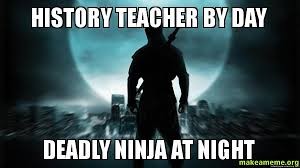The Fourth in a Series of Five Guest Posts
Over the past thirty two years I must have taught a huge number of students. Like all teachers, there are some I remember fondly and many more that I choose to expunge immediately from my memory. Daryl Morini is a young man who belongs squarely in that smaller, first group. I’m sure he will be delighted to read that I have even elevated him to the pantheon of past greats … Daryl relishes words like pantheon! He is a highly gifted student; fluent in several languages, soon to complete a Phd and destined for a glittering career in International Relations. It is our collective good fortune that Daryl has agreed to provide an erudite, thought provoking guest post. (Which also says some nice things about me … kudos.) All the hyperlinks are of Daryl’s creation and well worth exploring.
Wit and Twitter: On Education, Information and Knowledge

Daryl Morini
The creative and responsible use of social media in the classroom can open up a thousand doors in students’ minds. It can kindle their intellectual interests and passions, it can develop their imagination and empathy and, most importantly, it can nourish their curiosity and reason – and leave them hungry for life-long learning.
However, I am equally convinced that the unfettered, unreflective and irresponsible use of Twitter and Facebook in education could feasibly lead to our long-term intellectual stagnation bred from short-sighted faddishness.
As you may already be able to tell, where some see a digital utopia and others a hellish dystopia in the social media revolution, I see endless shades of grey in a purgatory full of clear opportunities and hidden dangers. I am, in many ways, a bit of a self-confessed dinosaur when it comes to my own generation’s penchant for the free flow of personal information into the overlapping public spheres which make up “the Internets.”
Graduating from Aquinas College in 2006, I pursued a Bachelor of Arts in History and International Relations. Enamoured with the study of history – which I first fully embraced in Simon’s classroom – I took this passion with me into my postgraduate study on the burning questions of international war and peace. I intend (or, rather, fervently hope) to submit my PhD in early 2014. My research focuses on preventive diplomacy, which is a fancy way of saying that I seek to understand how wars have been prevented in the past, and how they might be prevented in the future.
Looking back, I can now see that my online activities did contribute to getting me this far. I worked countless hours (and I still do) on online extra-curricular projects, including working for three years as a volunteer editor on e-International Relations, the largest student-run website in my field. Furthermore, I have complemented my studies with three internships in government departments and major international organisations, including a brief stint at the United Nations late last year. Paradoxically, I have been a somewhat timid social networker, preferring public conferences, lecture halls and face-to-face meetings.
Let me offer three philosophical points explaining my highly-qualified embrace of social media in general, followed by a final set of practical policy positions on social media in education specifically.
Firstly, my brief time using Twitter has convinced me of this: it is a poor substitute for real conversations. Rather than a global dialogue, I see a cacophony of competing and self-promotional soliloquies. This is not to say that fruitful exchanges do not take place on Twitter, or that useful connections are not made, or that crucial information is not shared across the world in real-time. Of course they are, and that is a wonderful thing. My point is simply that Twitter seems to reward (with additional followers) members of the Twitterati on the wit, cleverness or humour of their remarks, rather than on the truth, originality or social benefit of their reflections. This was brought home to me during the 2012 U.S. foreign policy election debate, during which the live stream of Twitter comments very quickly descended into name-calling and humorous Internet memes of purely entertainment value.
Maybe I am the one missing the point here. I am quite possibly standing on the wrong side of history. But I do find something deeply unsatisfying about the vacuity of some Twitter exchanges or, rather, the hollowness of SMS-length online conversations in comparison to the richness of face-to-face communication and debate.
Secondly, time. Time is finite, fleeting and fast. It is also inevitably zero-sum. The hours you spend each day checking your inbox, posting on Facebook or tweeting to your followers is time you will never retrieve. You may, of course, justify it as a wise social investment in your own online influence, if you believe in that. As a thought experiment, I like to question whether our greatest intellectual ancestors – who frequently took years or decades of undivided attention to accomplish their major works – would have found the time and concentration span to complete their magnum opus in the age of Twitter. For these reasons, I try to minimise my online networking time due to this simple trade-off: one hour I spend reading the opinions of the moderns is one less hour I can spend with the Ancients – a Thucydides or a Plato.
Of course, not all dead sages are more relevant to modern life than today’s Twitter feeds, but they often are. The distinction to make here is between information and knowledge. Simply put, we are inundated, water-boarded and almost drowned by the sheer volume of information we consume across the range of modern media. Amid that sea of data, some simple wisdom from the past can become a life-saving raft. You can know everything that is going on in the world without ever understanding why or how. And that is the difference between acquiring a breadth of information and a depth of knowledge. Both are important, I simply value the latter more.
Finally, and here I start to sound like a roaring dinosaur, the jury is still out on the long-term social consequences of mass social media and nternet usage. In other words, this is a huge, untested social experiment. Some results are in, however, and not all are as peachy as we sometimes assume or hope. Some questions we should be debating include:
Is Facebook making us lonelier? Is Google making us stupid? Is Twitter making us more narcissistic? Is our brain’s capacity to concentrate being eroded by our shorter and shorter attention spans? Does the Internet encourage mental illness? Should babies play with iPads? How young is too young? Do we have a clue about what the likely long-term effects will be? Are social media making us freer, or slaves to spies and censorship?
I do not have the answers, but I think the questions are very poignant indeed. It is a debate worth having.
So much for my general concerns about social media. What of their use in education?
This is where my hard-headed optimistic side comes in. I fundamentally agree with Simon that schools have wasted too much time playing catch-up with social media. They need to integrate this new reality into the core of the curriculum, and they need to do so urgently. This conclusion may sound counter-intuitive following on the heels of the highly-qualified above analysis. But where else, if not at school, will pupils – who will soon graduate as citizens – learn how to use the internet safely and responsibly? Schools are perfectly placed to play the role of society’s first line of defence, by raising awareness, warning of dangers and preventing the potentially deleterious effects of social media and internet use I have mentioned.
Moreover, I have been impressed by the very creative ways in which Twitter has been harnessed, for example, to teach about history and its ongoing relevance. I personally congratulated Alwyn Collinson, an Oxford history graduate, for his brilliant initiative in live-tweeting the entire Second World War. By showing how ordinary people experienced, suffered and fought in the war, this project demonstrates to contemporaries the daily reality of war, in a way that academic monographs and elite-focussed history books are simply unable to. This is a very useful way to use social media in education, so long as it does not reduce history to funny caricatures.
I similarly congratulate Simon on his clever use of Twitter in the classroom. As a university tutor, I definitely see its educational potential. And I join him in proclaiming: ‘Death to PowerPoint!’ As General McMaster said of the U.S. military’s over-reliance on confusing PowerPoint presentations: “Some problems in the world are not bullet-izable.” I also have experience with the notoriously clunky and user-unfriendly learning software Blackboard, which lecturers quietly curse under their breaths; many are resorting to WordPress and Twitter to host classroom blogs as educational alternatives, and I whole-heartedly encourage them in doing so.
In other words, educational institutions should be the vanguard of the social media revolution. I endorse this policy position having carefully weighed and pondered the aforementioned risks and unknown factors. In the end, the Internet is a tool, and like all tools it is morally-neutral – capable of being used to good or bad ends. The more good people, like Simon, we have working hard to persuade fence-sitters, the better off we will be.
—
Daryl Morini is a PhD student in International Relations at the University of Queensland. Follow him on his modest Twitter account: @DarylMorini.












